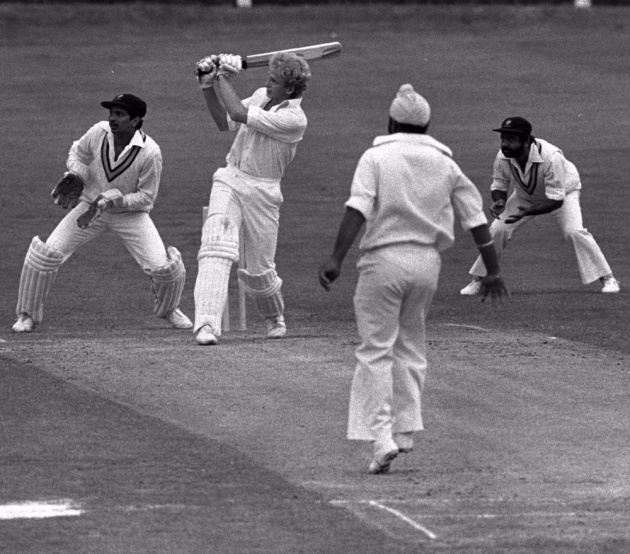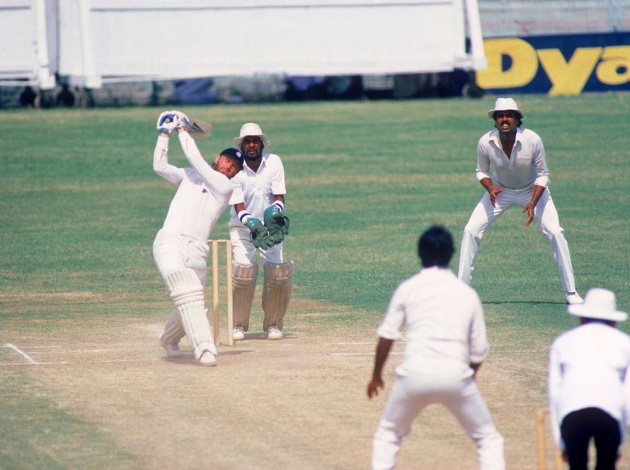Talking captaincy, elegance and the playing of spin with the great England stylist

"Ï wish God hadn't made me so beautiful." The girl who uttered these words must have forever regretted them. She was one of the brighter students of Chennai's Presidency College during my own student years there, and this was her reaction to the catcalls and whistles that greeted her at the college gate every morning courtesy a gathering of louts inspired by the so-called heroes of the Tamil cinema of the day. Of course, her naïve response to their harassment only added to the ammunition of her tormentors.
David Ivon Gower, recently in Chennai to deliver the first KS Narayanan Oration, perhaps never had cause to regret his good looks, but I am not sure he was entirely happy with the media hype about the lazy elegance of his batting. He did hint during his interactions with Chennai's cricket enthusiasts that much effort went into his effortless batting.
I have this irritating habit of drawing parallels from other walks of life, especially the world of art, and I could not help remembering a lament of the late MS Subbulakshmi, one of the greatest Indian vocalists of our time. Though she was hurt by constantly being described as just a great voice, she rarely expressed her disappointment at it. She did sometimes drop her guard and confide in her closest associates, saying, "People always speak of my great voice and give me little credit for my technical prowess. They don't know how hard I must work to achieve my 'natural' voice.''
In Gower's case, while it was all very well to have fans and critics swoon over his left-hander's grace and the time he had to play his stylish shots, it must have been less pleasant when critics saw the very effortlessness of his successes as the irresponsibility that caused his failures.
In his informal conversations with cricket aficionados in Chennai, Gower did reveal a tinge of regret at how this so-called casualness was labelled the villain in English defeats in his time, though his wry sense of humour has a way of converting every jibe into a joke.
With his golden curls, his carefree approach to batting, and the elegance of his shotmaking, Gower was certainly one of the most popular overseas cricketers to play in Chennai, but it was a revelation that he still has a fan following here decades after he last played in the city. Gower himself was overwhelmed by the high level of awareness of cricket history among the locals he met. "Their knowledge of my cricket statistics is quite amazing,'' he said.

Ray Illingworth, Mike Brearley and Richie Benaud were the captains who inspired Gower. ''Be yourself'' was the mantra he followed as captain, and asked his players to follow, but he also never forgot Benaud's advice, ''Captaincy is 90% luck and 10% skill, but don't try it without that 10%." In the early days of his captaincy Alastair Cook, Gower claims, was trying to be Andrew Strauss, and the improvement when he decided to be himself was palpable.
Beating India in India in 1984-85 was among his finest hours as captain, second only to England's Ashes win the same year for the amount of satisfaction he derived from it. Though his on-off career as both player and captain was not easy to deal with, and he is generally self-deprecatory about his captaincy, he recalls with some pride that he gave his players the freedom to express themselves on the field and in team meetings. He believed in giving each player responsibility, sometimes specific responsibilities. The results were there for all to see - for instance in the almost unexpected successes of Graeme Fowler and Mike Gatting in India.
Fowler tended sometimes to behave like a kid and was treated as one. By giving him the responsibility and encouragement to open the innings in alien conditions, Gower made sure the boy grew up.
Gatting, who had debuted for England before Gower, had been in and out of the team for some seven years, and he too was given the freedom to play his natural game, and his appointment as vice-captain placed on him added responsibility. Both scored runs in the series opener in Bombay, disastrous for England, where L Sivaramakrishnan took 12 wickets to send them hurtling down to defeat, but the English batsmen bounced back in the very next Test, in Delhi, though Siva's golden streak continued, with another six-wicket haul in England's first innings. By this time, however, there was a distinct change of mindset among the English batsmen, who were beginning to play the bowling on its merits, without getting bamboozled by the turning ball.
Gatting and Fowler made the transformation complete when they scored double-centuries in theMadras Test. In this match, a new fast bowler had emerged in Neil Foster, who took 11 wickets in the match, starting with a fiery spell on the first morning. The captain's laid-back but confident style had paid off.
During Gower's Chennai visit, he and I talked about a match we had played against each other back in January 1978, he for a Perth club, and I for the touring Hyderabad Blues. I remembered that he had been uncomfortable against spin in that game, and marvelled at his rapid progress in that department which enabled him to make a double-hundred against India the following year. ''I was a novice against spin when we played that match'', he said, ''and I worked really hard when I went back to England. I had help from my captain, Ray Illingworth, and other team-mates, and we worked systematically on my approach to playing slow bowling.'' This was evidence of the steel under that casual exterior, the same determination that helped him to play the great West Indian pacemen better than many other batsmen of his era.
V Ramnarayan bowled offspin for Hyderabad and South Zone in the 1970s. His latest book isThird Man, Recollections from a Life in Cricket



